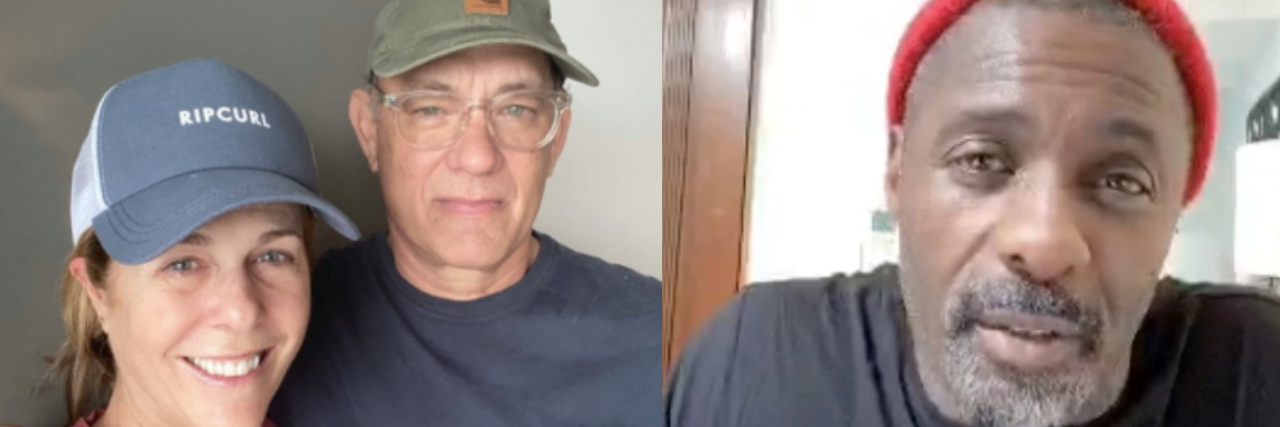Celebrities Are Getting Tested for COVID-19. What About the Rest of Us?
Sometimes the news isn’t as straightforward as it’s made to seem. Julia Métraux, The Mighty’s editorial fellow, explains what to keep in mind if you see this topic or similar stories in your newsfeed. This is The Mighty Takeaway.
Over the past few weeks, it seems like there have been two types of stories when it comes to people trying to get tested for COVID-19, a respiratory virus that includes symptoms like fever, cough and breathing problems. The first is how celebrities like Tom Hanks, Idris Elba, players on the Utah Jazz basketball team, and Canadian Prime Minister Justin Trudeau’s wife tested positive for the coronavirus.
The second type of story is about non-famous people struggling to get tested, even if they display symptoms of COVID-19 or interacted with someone who tested positive for the coronavirus. The specialized swabs needed to test patients for the novel coronavirus are already running out.
While it is good we’re testing people, even celebrities, for COVID-19, the ease in which celebrities seem to be getting tested compared to the general public highlights how wealthy people receive better health, both here in the United States and even in countries with nationalized healthcare systems like Australia, England and Canada.
I have an autoimmune disease, vasculitis, which would make me a high-risk patient if I do become sick with COVID-19. I am currently in Massachusetts where Governor Charlie Baker declared a state of emergency because of the escalating number of diagnosed COVID-19 cases. While I am trying my best to self-isolate, there is still a chance someone could spread this virus to me. I should be coming up with a plan of how to get treated if I get the coronavirus, not be worried that I might not even be able to get tested.
In an article, Mighty contributor Lara Etzen shared her experience of being unable to get tested for COVID-19 despite showing symptoms and being chronically ill, which captures the fears that many immunocompromised people have right now in the United States. Etzen wrote:
I am poor, on state-funded programs and Medi-Cal (Medicaid). The ER I went to is predominately low income, Medi-Cal patients. Two different doctors at that hospital tried to get the test approved by calling the Public Health Department. One doctor didn’t want to even send me home because of my complications and extensive medical history. All efforts were denied testing for coronavirus because of two parameters set in place:
1. I haven’t been out of the country.
2. I haven’t, to my knowledge, been around a patient diagnosed with COVID-19.
People considered high-risk, those who are older, immunocompromised or have an underlying medical condition, should be prioritized when it comes to getting tested for COVID-19. This extends to everyone, famous and non-famous, which is why it is alarming that 58 tests were secured for the Utah Jazz basketball team, amounting to about 60% of Oklahoma’s coronavirus tests while news report after news report highlighted a testing shortage everywhere.
I do not understand the logic behind testing an entire basketball team rather than asking them to quarantine for two weeks and test the people who are displaying symptoms. Those 58 tests could have been used to test symptomatic, immunocompromised and elderly people. The decision to cancel NBA’s season could have been done without using all of those tests by listening to the advice of medical and public health experts.
These celebrities, sports figures and other wealthy people could also afford to get tests done privately and not use limited resources that are available to the public. They could also help fund testing and buy more supplies to help with shortages in labs. Certain stunts like Gal Gadot gathering other celebrities to sing “Imagine” by John Lennon are frankly useless and seem more like an out-of-touch publicity stunt. If they truly want to help people, these multimillionaires can put their money where their “singing” mouths are.
It is more understandable why political figures like Sophie Grégoire Trudeau, Canadian Prime Minister Justin Trudeau’s wife, would be tested for the coronavirus. Politicians and people associated with them engage with many people, and it may influence people they have met with (and the public watching) to go into self-quarantine. Prime Minister Trudeau, who said he had not displayed symptoms, conducted all of his meetings from his house once his wife tested positive for COVID-19.
Other issues that could greatly affect who gets tested are financial, namely the costs of emergency room visits and the cost of the tests themselves for people who are uninsured. I was told by my hospital to go to the emergency room if I display any symptoms, which would cost me a few hundred dollars. For people without health insurance, this could easily cost in the thousands.
U.S. President Donald Trump signed coronavirus relief bill into law yesterday that included provisions for free testing for COVID-19, which should offset financial burdens that Americans face while trying to get tested for the coronavirus. However, it’s unclear if emergency room fees are covered and what happens if you test positive and need treatment.
The disparity of who gets tested for COVID-19 exposes an issue that has been long known in the United States and other countries: Money affords certain health care privileges. It is unfortunate, but it goes to show that the medical system prioritizes some people’s lives and health over others.
Header Image created via Twitter/Canva

